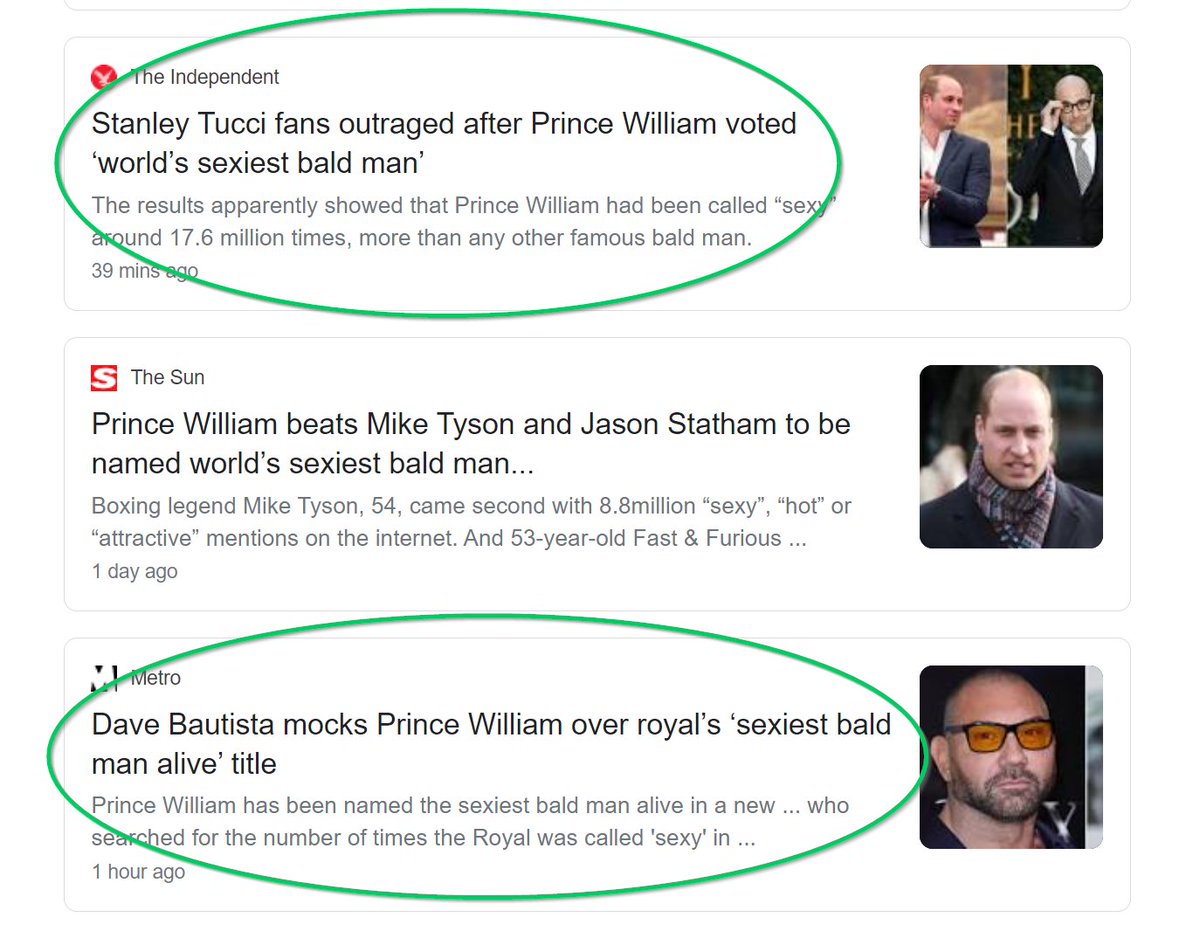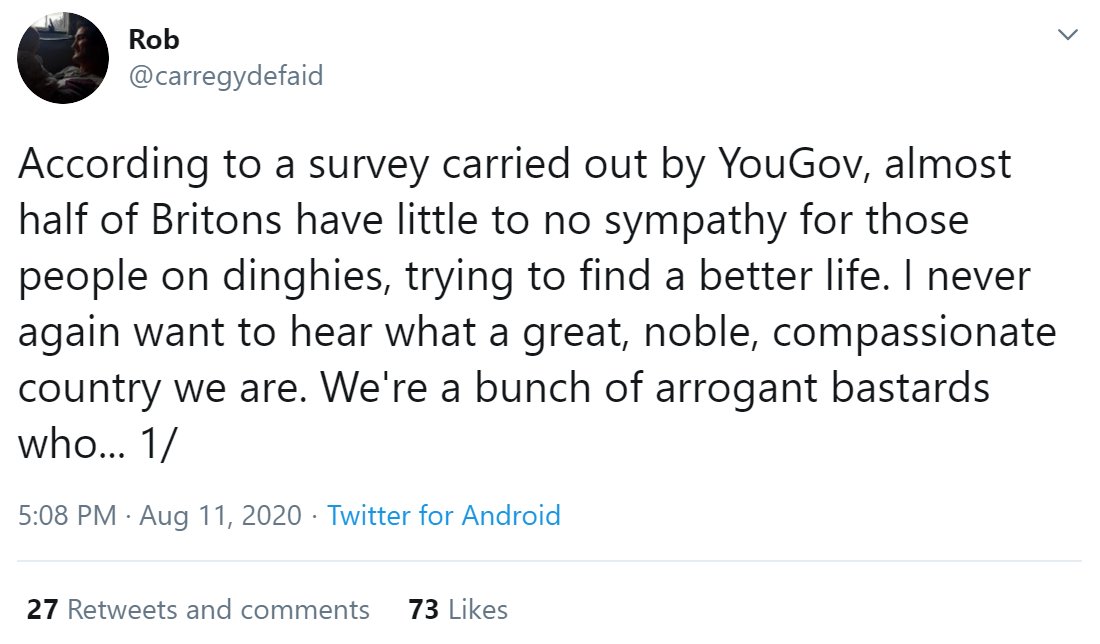
The whole "Prince William is world's sexiest bald man" says "Google study" thing.
I'm sure most people realise what's happened, but in case not, here is a brief explanation:
This is the headline on the version of the story that's been shared the most (from the Independent)...
I'm sure most people realise what's happened, but in case not, here is a brief explanation:
This is the headline on the version of the story that's been shared the most (from the Independent)...

That's quite a neat headline, as it makes it sound like the study is *by* Google, when obviously it isn't.
They back that up in the text with this note.
The study was 'using Google'.
They back that up in the text with this note.
The study was 'using Google'.

You can also see above, The Independent cite that the report appeared in The Sun. That basically means they've cribbed the whole article from The Sun & put a small spin on it.
The Independent's tweet has been very heavily shared.
The Independent's tweet has been very heavily shared.

The reasons The Independent's version is more popular on Twitter than the original from The Sun are:
1. That nice 'Google study' note in the headline.
2. Some people don't like sharing stuff from The Sun.
3. (most important) The Sun don't seem to have shared it to Twitter 🤪
1. That nice 'Google study' note in the headline.
2. Some people don't like sharing stuff from The Sun.
3. (most important) The Sun don't seem to have shared it to Twitter 🤪
You can also see from above there's a heavy RT/Quote ratio on the Tweet (see bottom of this image).
If something has loads of Quote Tweets compared to Retweets, that usually means that people are commenting on it, or making fun of it.
If something has loads of Quote Tweets compared to Retweets, that usually means that people are commenting on it, or making fun of it.

Anyway, here's the detail on the study (below, see the numbers)
Pretty weird, eh? 17.6 million people said Prince William was the most 'sexy'. That's a huge study. Google surveys generally cost £0.08 per response, which would mean they'd spent over a million quid on the study...
Pretty weird, eh? 17.6 million people said Prince William was the most 'sexy'. That's a huge study. Google surveys generally cost £0.08 per response, which would mean they'd spent over a million quid on the study...

... only it's not a survey, the detail on the methodology is just this:
"The 38-year-old Duke has been described as “sexy” a whopping 17.6million times online in blogs, reports and pages found in Google searches, researchers found."
"The 38-year-old Duke has been described as “sexy” a whopping 17.6million times online in blogs, reports and pages found in Google searches, researchers found."
In other words, they've tried to use Google to find out how many pages mention prince william and 'sexy', or michael jordan and 'sexy', or jason statham and 'sexy'.
Obviously, there are various problems with that...

Obviously, there are various problems with that...


1. Prince William's not always been bald. Perhaps some of those pages are from pre-baldness.
2. The number of pages mentioning those words says nothing about their relevance. Eg, there are more pages referencing 'qanon' than 'rastafarianism'. That doesn't mean anything.

2. The number of pages mentioning those words says nothing about their relevance. Eg, there are more pages referencing 'qanon' than 'rastafarianism'. That doesn't mean anything.


3. Most importantly: That's not how Google works. If you search for 'prince william sexy', not all of the results will even contain those 3 words, let alone in the context of there being a relationship between them.
And if you search for the exact phrase, you get just 1 result:
And if you search for the exact phrase, you get just 1 result:

So what is actually going on?
It's a PR piece by a firm called Longevita, who offer... hair transplants.
They've put the story out to The Sun, who have published it. For some reason The Sun haven't pushed it on social, but The Independent & others (LadBible, etc) did.
It's a PR piece by a firm called Longevita, who offer... hair transplants.
They've put the story out to The Sun, who have published it. For some reason The Sun haven't pushed it on social, but The Independent & others (LadBible, etc) did.

It suits Longevita for Prince William to be top of the list, because Longevita offer hair transplants.
They want to:
1. Keep their name out there & get lots of mentions related to baldness.
2. Actually they do *not* want to position baldness as 'sexy'.
They want to:
1. Keep their name out there & get lots of mentions related to baldness.
2. Actually they do *not* want to position baldness as 'sexy'.
(It also helps that Prince William is super newsworthy at all times, but particularly at the moment, so including him in a 'study' increases the likelihood of a newspaper picking it up.)
So having Prince William & baldness being made fun of, rather than people swooning over photos of Jason Statham, or Stanley Tucci, or Bruce Willis makes good sense, and lots of people assume it is Palace PR, so take a jab at it & spread it further too. 







It's important to note that The Sun & The Independent both put out the article with a straight face, often meaning people will laugh/criticise more.
And now of course, as it's gone viral, you can see the papers picking up extra traffic by reporting on the 'responses'.
And now of course, as it's gone viral, you can see the papers picking up extra traffic by reporting on the 'responses'.

Summary:
1. A PR put out a badly researched piece to get Longevita in the news.
2. The Sun picked it up as it fits stuff they talk about.
3. The Independent nudged a bit of extra authenticity by calling it a 'Google study'
4. They both 'straight faced' it, allowing criticism.
1. A PR put out a badly researched piece to get Longevita in the news.
2. The Sun picked it up as it fits stuff they talk about.
3. The Independent nudged a bit of extra authenticity by calling it a 'Google study'
4. They both 'straight faced' it, allowing criticism.
5. The result was (probably deliberately) not believable, in a way that positions baldness as being kind of funny, rather than actually 'sexy'.
6. Everyone fell for that & made fun of William, & allowed for some follow up 'Stanley Tucci fans are mad' articles.
6. Everyone fell for that & made fun of William, & allowed for some follow up 'Stanley Tucci fans are mad' articles.
Outcome:
- Longevita got a bunch of mentions. (arguably they messed up a bit too, by not publishing the study on their site & picking up links)
- Some news sites made a bit of money from ads, & various people laughed at Prince William's expense
- Longevita got a bunch of mentions. (arguably they messed up a bit too, by not publishing the study on their site & picking up links)
- Some news sites made a bit of money from ads, & various people laughed at Prince William's expense
• • •
Missing some Tweet in this thread? You can try to
force a refresh
























